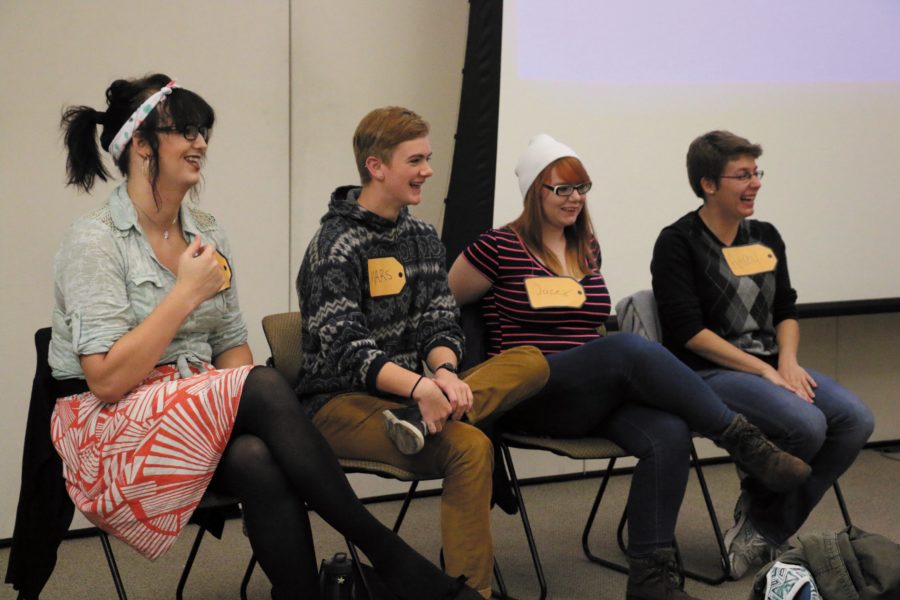Does he look gay? Or is he bisexual? Asexual? Straight?
These were the sort of questions audience members asked themselves at the University of Idaho LGBTQA Office’s event “Can You Guess? The Sexual Orientation Game Show.” Four panelists sat down Sept. 4 and their audience answered polls about what they thought the panelists’ sexualities were.

Panelists Madeline Scyphers, Mars Cantrell, Jacey Hjaltelin and Autrey Jeske laugh while responding to questions during the Sexual Orientation Game Show in the Commons Whitewater Room on Tuesday.
In the first round, guesses were made based just on appearance. For the second round, panelists were asked questions by audience members before the poll was taken.
Panelists then revealed their sexualities and the entire group had a discussion about stereotypes and sexuality.
Julia Keleher, director of the LBGTQA Office, said the goal of the event was to have people think about how they determine who they are and who other people are. She said it helps to demonstrate the depth of an identity.
“So like, you ask common questions like what’s your favorite band, your favorite TV show, what’s your major?” Keleher said. “Like, it kind of shows, too, that those students are just like everybody else and, like, their sexual orientation is just a small part of who we are.”
Keleher said she’d held this event before at different universities, but this was her first time doing it at UI. The event helps kick off LGBTQA History Month, and Keleher said she thinks it balances serious issues with lightheartedness.
“It’s always a lot of fun,” Keleher said. “I think it’s fun to have a program that makes you think, but then to make you kind of laugh at the same time.”
The audience had four sexualities to choose from to label each panelist — straight, gay, bisexual/pansexual and asexual. Pansexualism is defined as having a sexual attraction to a person who falls anywhere on the gender spectrum and asexualism is defined as having no sexual attraction to other people.
Guesses varied between each panelist during the first round, and only one panelist had more than half the audience label them as a specific sexuality. Most often, the accuracy level fell between a range of 15 to 35 percent.
Then the audience started asking questions.
The group was asked to name their favorite movie, TV show and musical artist. They were asked why they chose their hairstyles and what they would do with their last day on earth. They were asked about their biggest fear and their biggest inspiration.
Panelist Madeline Scyphers said she had a great time at the event and liked the creativity of the questions she was asked.
“What questions do you ask someone to try to figure out their sexual orientation when you can’t ask them questions that pertain to their sexual orientation?” Scyphers said.
She said it was interesting to see how people perceived her.
“I think I learned things about how people perceive me that I suspected but was not sure of. You can ask my friends — I’m really gay, but I present it in a very feminine way. I wear a lot of skirts and things like that,” Scyphers said. “And so people don’t perceive feminine women as queer.”
Scyphers said her sexuality is complicated, but she tends to prefer women. Only 20 percent of audience members guessed she was gay and another 20 percent guessed she was bisexual or pansexual. Panelist Jacey Hjaltalin had 40 percent of audience members correctly guess she was pansexual while Mars Cantrell had 63 percent of members guess he was gay. Cantrell said he is bisexual, but favors men.
The level of accuracy between round one and round two didn’t change much. The largest difference was for panelist Autrey Jeske. In the first round, 38 percent of people thought she was gay, and the number dropped to 27 percent in the second round. Jeske said she is both gay and asexual.
Keleher said the event went well and she hopes it will have a good impact at UI.
“I think people hopefully made them think a little bit more about identity and how people look and how we look at other people and I think hopefully people had fun and learned a little bit,” Keleher said.
Jack Olson can be reached at
